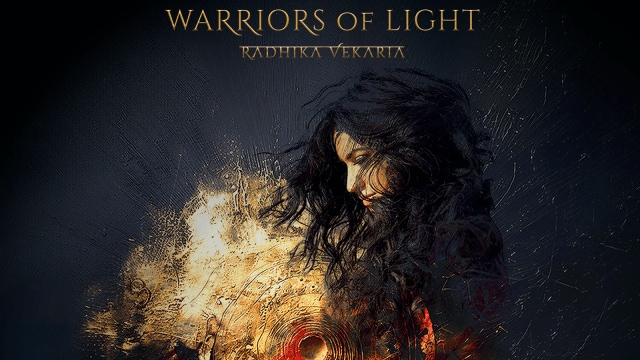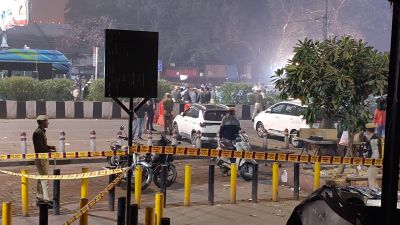📣 For more lifestyle news, click here to join our WhatsApp Channel and also follow us on Instagram
Meet Radhika Vekaria, Indian-origin vocalist competing at the Grammys this weekend
Vekaria, who is in her 30s, is nominated for best album in the new age, ambient or chant category.
 Warriors of Light by Radhika Vekaria
Warriors of Light by Radhika VekariaIndian-origin British musician Radhika Vekaria, who now lives in the US, grew up with a chronic speech impediment. “I had a stutter, well into my late teens. I couldn’t articulate myself with fluidity,” says Vekaria.
But she could always sing. Even before she could speak.
And the first few things that Vekaria was drawn to and could croon were bhajans and chants, which were heard in her Gujarati home in London. There were also film songs by Mohammad Rafi and KL Saigal – ones that her father, an amateur vocalist, sang and played. “And as soon as I started singing this music, I found life just started inviting me just to speak, and engage. That’s how much it healed my voice, that I could speak. I found a lot of resilience through the chants,” says Vekaria, whose new album Warriors of Light, which has her chanting the Hanuman Chalisa, Maha Mrityunjaya Mantra, and the noted Ramdhun ‘Raghupati raghav raja ram’ along a piano. “This music connects me to my roots. Growing up in England, away from your origin, it connects you with a deeper root, a place that you come from,” says Vekaria
But what Vekaria never factored in was that her deep dive into chants that helped her overcome her “incredible impairment”, will find recognition on a global platform and compete for the biggest award of the year – the Grammys. On February 3, Vekaria will walk the red carpet at Crypto.com arena in Los Angeles at the star studded award ceremony, likely rubbing shoulders with the likes of Beyonce and Taylor Swift, in the hope to take the golden gramophone home, after her first ever nomination. “If you asked me some years ago, I would have said that this was just not possible,” she says.
Vekaria, who is in her 30s, is nominated for best album in the new age, ambient or chant category. She is competing with sitar player and a veteran Grammy nominee Anoushka Shankar (who has been nominated 11 times in her career), who’s listed with her album Chapter II: How Dark It Is Before Dawn; Ricky Kej (Break of Dawn); Chandrika Tandon, Wouter Kellerman, Éru Matsumoto (Triveni); recording artist and producer Chris Reddings (Visions of Sounds) and Japanese composer Ryuichi Sakamoto (Opus). “I am just really glad to be in such esteemed company. These are some very experienced and fine musicians,” says Vekaria
While growing up in London, Vekaria trained in western classical piano. But it was an Indian home and festivals and dinner parties came with a flurry of old film songs or devotional music. “Music of our heritage is so incredibly rich. I believe that there are two things that carry our culture very well – food and music. Both are very tangible visceral experiences. Everytime I heard Indian music, I felt it in my body. And the body doesn’t lie,” she says.
But even though she loved music, it was a part of the background for Vekaria who was all set to be an oncologist and ready to leave for Oxbridge when an epiphany changed her mind. She wanted to be a musician and it wasn’t going to be possible with the arduous education and hours that medicine demanded. She asked her father, a music connoisseur, if she could look at music as a career. “Very unlike an Indian parent, he was supportive and said that I should go ahead and do it,” says Vekaria, who also lost her father sometime later due to cancer,
“Life has this incredible way of bringing you to what your heart loves. Mantras were always there, naturally for me. I sang them because it was a part of my own devotional practice. I didn’t even want to record. But many people heard and said that I should record and I relented,” says Vekaria, who lost her father to cancer soon after. “I so wanted to heal the world. Then I thought why not do it through music,” she says.
A huge turning point for her was in 2009, when she did a few of the shows with AR Rahman after being selected through an audition. “I was playing with the sounds, because I did not know the language. He was also present and trying to vocalise that music was a life-changing experience,” says Vekaria, who’s also sung a Tamil bhavgeet Aganitha Tara (The Dance of Countless Stars), sage Agastya’s noted piece from almost 4000 years ago.
In 2013, Vekaria moved to the US to be a songwriter. Mainly because “London was a bit stifling at the time”. She also went on to take a few sessions under the aegis of Patiala gharana classical vocalist Ajoy Chakrabarty followed by training at Ustad Ali Akbar College of Music in California. But for a young artiste with no connections in the world of music, breaking in was not going to be easy. After doing a few songwriting gigs, Vekaria met a Norwegian producer and began writing about “life from the soul’s perspective”. “It wasn’t mainstream music but it allowed me to create what I really wanted to,” says Vekaria, who navigated the unknown thinking that is the space where everything is possible. “People wanted to try new things in the US,” says Vekaria, who came up with the idea of leading the fight within oneself leading to Warriors of Light, which opens with Astoma sadgamaya from the Upanishads followed by odes to Kali and Durga. All of the songs are interwoven with English lyrics. “An artiste must be honest. You can be deceived by words but you can never be deceived by music,” says Vekaria
📣 For more lifestyle news, click here to join our WhatsApp Channel and also follow us on Instagram





- 01
- 02
- 03
- 04
- 05






















